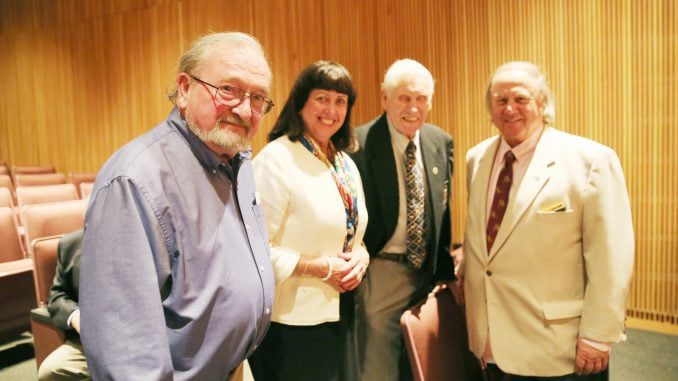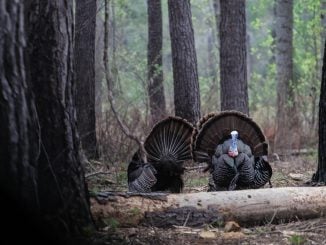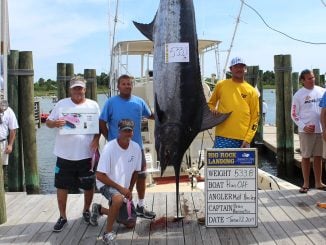
RALEIGH — As Eddie Bridges recalls, there were really only two things for young men like himself growing up in Burke County to do back in the days following the end of World War II.
Chase girls and go fishing.
Young men in Burke County still do their fair share of chasing girls. But these days, there’s not as much fishing going on.
“I remember going fishing with my dad from the time I was 6 or 7 years old,” Bridges said. “Back then there were lots of opportunities to do that. Now it’s all houses and shopping centers.”
Bridges’ love for the outdoors has never waned. And despite the dwindling number of places for him to cast a line, he’s determined to share his enjoyment of North Carolina’s rivers and streams with children of today.

That’s why at the age of 86, after more than four decades of contributions, he continues to work tirelessly on conservation and wildlife educational projects throughout his home state. It’s an effort that was rewarded in May with his induction into the North Carolina Sports Hall of Fame.
Bridges is joined in this year’s Hall of Fame class by football player and artist Ernie Barnes, administrator Willie Bradshaw, football coach Rod Broadway, former ACC commissioner Gene Corrigan, NASCAR driver Dale Earnhardt Jr., wrestling coach Steve Gabriel, basketball referee Dee Kantner, golfer Davis Love III, longtime Elon athletic director Neill McGeachy, former UNC quarterback Paul Miller and football coach Thell Overman.
He is the first outdoorsman to gain entry into the prestigious shrine.
“I think it’s going to send a loud, loud message to North Carolina about how important the outdoors — hunting, fishing, conservation — is to the economy of the state,” Bridges said at his induction ceremony. “It’s not about Eddie Bridges. It’s about thousands of people who enjoy the outdoors.”
Bridges never set out to be one of the nation’s leading advocates for hunters, fishermen and wildlife enthusiasts.
It actually happened quite by accident.
After a career as a scholarship athlete at Elon from 1953-57, where he played football and ran track, he planned on a career as a teacher and coach. While he was waiting for his big break, he took a job as a salesman at a Greensboro sporting goods store.
“Divine order sometimes sends you in different directions,” he said. “I went (into the sporting goods business) and stayed there for 30 years. I met a lot of people doing that just kept getting me deeper and deeper into (the outdoors).”
Bridges’ most significant contribution to those masses came during his two terms as a member of the North Carolina Wildlife Resources Commission in the late 1970s and early ’80s.
Frustrated at the organization’s underfunding, he convinced his fellow members on the idea of issuing lifetime hunting, fishing and trapping licenses, with the fees going directly into the newly created N.C. Wildlife Endowment Fund. Supplemented by the sale of magazine subscriptions and donations, the endowment fund has grown to a whopping $123.5 million, with more than $29 million of that available for wildlife projects.
Bridges continued his work after leaving the Commission, starting his own nonprofit organization — among whose projects include a Caswell County waterfowl impoundment, a quail habitat at the Sandhills Game Land, restoration of mountain trout streams, fishing piers on public lakes, a major black bear study and establishment of the Frank A. Sharpe Jr. Wildlife Education Center at Bur-Mill Park in Greensboro.
His most recent endeavor has been creating a saltwater habitat that will create clean water for humans and marine animals, improve saltwater fish environments and provide a healthy population of oysters.
For his efforts, Bridges has been honored with four national conservation awards, including the national Conservationist of the Year in 2004.
As much as he’s done, he said that there’s still so much more left to do. His most passionate focus is getting young people to look up from their electronic devices and learn to appreciate the outdoors the way he did when he was growing up.
“If we don’t have these young people down the road, we are in bad trouble,” he said. “I mean, some serious trouble, especially the wildlife conservation folks, and hunting and fishing folks, because all these older folks are running the show now.
“We need to retain those young people in order to do what we do well. Hopefully we can influence some of them. There’s a real need to get the children involved in the outdoors.”



